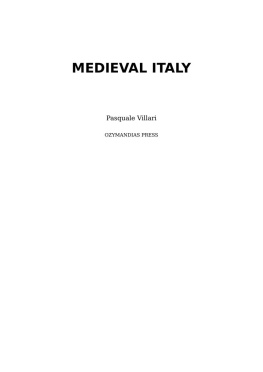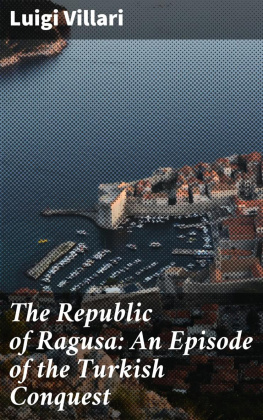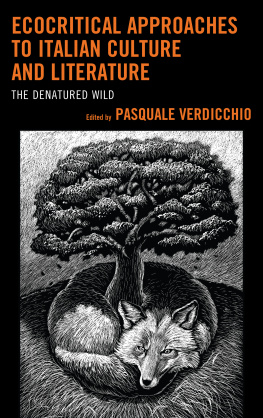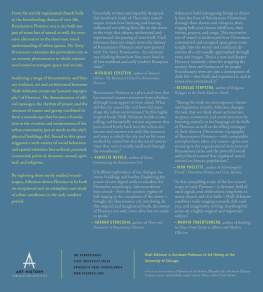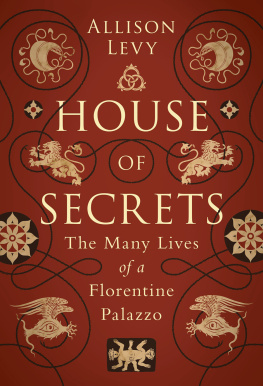BY THE SAME AUTHOR
THE LIFE AND TIMES OF GIROLAMO SAVONAROLA.
Fully Illustrated. Large crown 8vo, cloth, 2s. 6d.net.
THE LIFE AND TIMES OF NICCOL MACHIAVELLI.
With Photogravure Frontispiece. Large crown 8vo, cloth, 2s. 6d.net.
THE BARBARIAN INVASIONS OF ITALY.
With Frontispiece and Maps. Two vols. Demy 8vo, cloth, 32s.
STUDIES HISTORICAL AND CRITICAL.
With Seven Photogravure Plates. Demy 8vo, cloth, 15s.net.
LONDON: T. FISHER UNWIN.
THE MERCATO VECCHIO BEFORE ITS DEMOLITION.
The Two First Centuries of
Florentine History
THE REPUBLIC AND PARTIES
AT THE TIME OF DANTE
BY
PROFESSOR PASQUALE VILLARI
TRANSLATED BY
LINDA VILLARI
FOURTH IMPRESSION
ILLUSTRATED
London
T. FISHER UNWIN
1 Adelphi Terrace
1908
AUTHOR'S PREFACE TO THE ENGLISH VERSION.
BEFORE deciding to issue this translation I had first to reflect whether my Florentine studies could be of any use to the English public. Since Roscoe's day English literature has been enriched by works of much importance on different phases of the political, literary, and artistic history of Florence. Both Napier and Trollope have bequeathed very complete narratives of Florentine events, and translations of notable foreign works have also been produced. But nearly all these works appeared before any scientific research as to the origin of the City and Commonwealth had begun, or, at least, before it had reached the results I have briefly expounded, and which deserve notice, not only on the score of intrinsic worth, but also because they throw new light on the subsequent history of Florence.
To attempt any new delineation of the special vicissitudes of the Florentine Republic, already so exhaustively and lucidly treated by other historians, would have been outside my purpose. As stated in the preface to the Italian edition, my sole aim was to investigate in what manner the Republic was formed, the nature of its constitution, the why and wherefore of its continual transmutations, the first causes and genuine motives of the factions by which the city was torn, and likewise to ascertain how it came about thatdespite all this turbulence and strifecommerce and industry, the fine arts and letters should have been able to achieve such marvellous results. Now, so far as I know, English literature contains nothing on this particular theme, although one that can scarcely fail to be of some use and interest even to readers familiar with greater works and more extended and detailed accounts of Florentine history.
These researches are not pursued beyond the times of Dante and Henry VII., inasmuch as that term actually marks the close of the period during which the Republic took shape and built up its constitution. This was followed by a new phase of equally high importance but very different character, during which the Republic entered, instead, on a course of decomposition. In fact, we have only to draw a comparison between the "Divine Comedy" and the "Decameron," to instantly perceive how deep was the change a few years had wrought in the spirit of Florence and of all Italy. These two works were almost contemporaneous, yet when reading them they seem to us the product of two entirely different ages. Whether in politics, religion, morals, or letters, the character of these two periods is seen to be essentially diverse. The Middle Ages, with all their rough primitive originality, have come to an end; classic learning and the Renaissance have begun. Touching this second period, there is no scarcity of information, documents, or chroniclers, as in the case of the first. The historian is confronted by totally novel problems to which numerous modern writers have given their attention, and which have also been investigated in previous works of my own.
Even this second period would certainly afford matter for another work on the gradual course of political and moral dissolution, during which art and literature blossomed to new splendour. Such investigations, however, would transport me beyond the limits I have set to this book. Under what conditions and amid what difficulties these researches were begun and carried forward has been already plainly told in my preface to the Italian edition. It only remains for me to crave the indulgence of English readers.
PASQUALE VILLARI.
AUTHOR'S PREFACE.
A WORD of explanation is due to my readers touching the genesis of the present work.
In 1866 I began a course of lectures at our Istituto Superiore on the History of Florence, chiefly for the purpose of examining the political constitution of the Republic, and investigating the various transformations it had undergone during the long series of internal revolutions by which the city was harassed. In this way I hoped to ascertain the veritable causes of those revolutions, to discover some leading thread through the mazes of Florentine history, which even when treated by great writers has often been found exceedingly involved and obscure, and likewise to determine the most logical mode of arranging it in periods. Even a partial solution of these problems would have been of some use. I continued the lectures for a considerable time, but suspended them on reaching the period of Giano della Bella's "Decrees of Justice" ( Ordinamenti di Giustizia ), 1293. Some of these discourses were published in the Milan Politecnico, others in the Nuova Antologia at Florence. It was then my intention to collect them in a volume; but after some hesitation I renounced the idea. It seemed indispensable to at least add some outline of the course of events subsequent to the fall of Giano della Bella and the exile of Dante, in order to conclude the first and most important period of the political history of Florence. Besides, I saw that the necessity of continuing these lectures on fixed days had not always allowed sufficient time for overcoming obstacles encountered by the way. Accordingly, more than a superficial revisal was required; gaps had to be filled in, certain pages re-written. Hence fresh researches were demanded, for which other labours granted no leisure at the moment.
Meanwhile new documents, new dissertations, and monographs on Florentine history were continually appearing, besides notable works on a larger scale such as those of Capponi, Del Lungo, Hartwig, Perrens, &c. All this increased the difficulty of revising and correcting lectures, now lapsing inevitably more and more out of date. On the other hand I sometimes found previous deductions confirmed by recently discovered documents, and that certain general ideas I had enounced were accepted and followed by writers of note. This naturally inclined me to be less severe in judging my work, and more disposed to listen to the tried friends who were urging its republication.
Being thus encouraged to resume my forsaken studies, I lectured in 1888 on the times of Henry VII. of Germany and the exile of Dante. Later on, in 1890, recognising that my previous work on the origins of the city and its commonwealth had become altogether inadequate since the appearance of so much new material, I returned to the subject in a fresh course of lectures, which likewise saw the light in the



